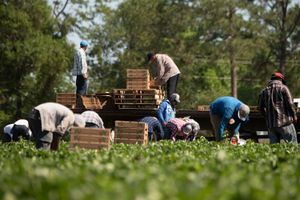Changing U.S. Ag Labor Is a Long Process in the Making

For decades, access to reliable labor has been a top concern for many farmers and ranchers across the United States. Are we closer to resolving that concern?
Many ag groups, leaders and organizations have made efforts to improve access to workers and have made some meaningful alterations to guest worker programs such as H-2A, but a shift in the regulatory paradigm in how we approach this concern deserves a meaningful solution.
The Farm Worker Modernization Act of 2019 was introduced with the support of 26 Democrats and 23 Republicans. It passed the full House Dec. 12 by a vote of 260 to 165 with 226 Democrats voting Yes for the legislation and three Democrats voting against it and 34 Republicans voting Yes and 161 Republicans voting No.
As of now, the House’s legislation’s broad strokes, according to the House, include:
- A title to establish a program for agricultural workers in the United States and their spouses and minor children to earn legal status through continued agricultural employment and contribution to the U.S. agricultural economy.
- A title to reform the H-2A program to provide more flexibility for employers, while ensuring critical protections for workers. The bill would focus on modifications to make the program more responsive and user-friendly for employers.
- A title that would establish a mandatory, nationwide E-Verify system for all agricultural employment, serving as the last necessary piece to ensure a legal workforce for the sector. The system would only be made mandatory for the agricultural sector, with a structured phase-in and guaranteed due process for authorized workers who are incorrectly rejected by the system.
Of course, the legislation’s final details or rules for implementation are not yet established. It will move through the Senate’s process and most likely return to the House for reconciliation before heading to President Donald Trump’s pen.
Far-right groups dismiss the bill outright because it provides what they say is an amnesty for illegal immigrants.
The bill has the support of the National Farmers Union and of more than 300 agricultural and business organizations and more than 80 immigrant and labor advocacy organizations. It does not have the support of the American Farm Bureau Federation as it is currently written.
“At a time when the farm worker shortage has reached a crisis in parts of the country, it is deeply disappointing that the House blocked any possibility of improving the legislation designed to address the problem, the Farm Workforce Modernization Act.
“Several amendments addressed our principal concerns, but were blocked from consideration. … We will turn our attention to the Senate where we hope legislation is crafted that provides long-term solutions to the farm labor crisis. Farmers need meaningful reform that addresses the concerns of both workers and growers,” said AFBF President Zippy Duvall in a Dec. 11 statement.
In a Dec. 12 release from AFBF, Allison Crittendon, the federation’s congressional relations director, said one primary concern is that farmers need a wage methodology out of labor reform that allows them to compete against imports coming in from Central and South America, where growers can grow, ship and sell produce in the U.S. far below the cost of U.S. growers.
“The wage methodology we are currently experiencing is putting farms out of business,” she said.
Action is being taken and the debate is not over.
Though running it seems on some partisan fuel and with some headwinds, the act seems to have the best legs under it to change U.S. ag labor law, which Congress hasn’t done majorly in almost 40 years.
Source: Brad Haire, Southeast Farm Press
